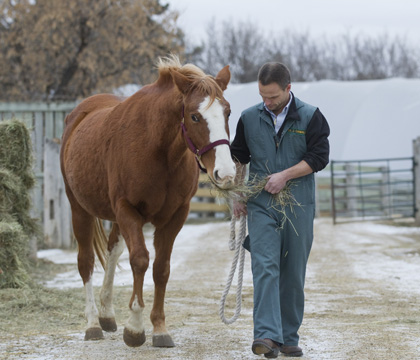It's one of the questions that researchers at the University of Saskatchewan's Western College of Veterinary Medicine (WCVM) are addressing through a 16-question survey of international equine practitioners. The online survey, which was launched in January 2012, is available on the WCVM web site until December 2012.
"Our objective is to determine the true prevalence of Cushing's disease worldwide, because until now, previous surveys were only based in the U.S.," explains Dr. James Carmalt, an equine surgeon and associate professor in the WCVM's Department of Large Animal Clinical Sciences.
Carmalt is also a PhD student in equine neurophysiology through the veterinary college's Department of Veterinary Pathology. He and his graduate supervisor, veterinary pathologist Dr. Andrew Allen, are beginning to explore a new treatment methodology for equine Cushing's disease.
View the Cushing's disease survey at www.wcvm.com/veterinarians/cushings_survey.php
Carmalt and his colleagues at the western Canadian veterinary college will use practitioners' responses to the brief survey to determine the incidence of the disease and the most common treatment protocols being used by practitioners in countries around the world. The WCVM researchers also want to evaluate the need for developing new treatment methodologies.
"Right now, the only available treatment for Cushing's disease requires daily dosing of medications for the rest of the horse's life. It's onerous, time consuming and a huge management challenge," says Carmalt, who urges horse owners to inform their veterinarians about the survey.
"If the responses from this survey reflect our impression that practitioners need a new option to offer their clients, our ultimate goal is to develop a one-time treatment for the disease so daily medications for Cushing's disease become unnecessary."
For more information about the Cushing's disease survey for equine practitioners, please contact Dr. James Carmalt. As part of the survey, practitioners can also provide their email addresses if they wish to receive a copy of the survey results.
